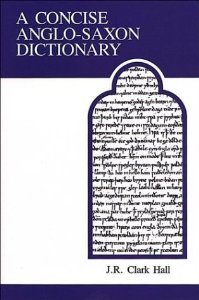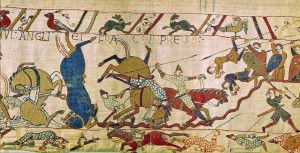Dr. Aaron Hostetter
217 Fine Arts
Fall 2013
MWF 10:10-11:05
Office: 477 Armitage Hall
Office Hours: MW 11:30-1:15 or by appt.
Email: akh58@camden.rutgers.edu

The Great Buckle (ca. early 7th c.), found at Sutton Hoo
The goal of this course is to gain a reading knowledge of the language of the Germanic invaders who invaded and settled the British Isles in approximately 500 C.E., a tongue which forms the base structure of modern English.
The story of our language is one of adaptation and evolution: of tongues changing as they are exposed to differences in speech, innovations in technology, and alterations in religious, political, and cultural values. It is a tale of supercession and survival and of words too useful just to go away. Just as the Angles, Saxons and Jutes did not fully destroy the speech of the Romanized Celtic peoples dwelling in Britain, the Anglo-Saxon language itself was not fully destroyed when English political power drastically shifted to the Normans after the Battle of Hastings. In between these invasions, the Old English language flourished and developed a complex and impressive body of written work, including some of the earliest literature produced in any vernacular: riddles, laws, homilies, recipes, charters, books of wisdom, translations, Biblical adaptations, elegies, and narrative poems. It is the language of Beowulf, the first epic poem in English, and of King Alfred, who yearned to capture the intellectual sophistication of Latin in the English tongue.
Together we will develop our knowledge of the mechanics and vocabulary of Old English. We will study the grammar and syntax of the language, learn how to decline nouns and adjectives as well as conjugate verbs, follow the perambulations of vowels around the inside the mouth, build a vocabulary, and translate regularly. In the process we will discover the beauty and power of the earliest English literature and gain insight into the perennial question of why modern English is such a tortured and convoluted language. Our method will be patient and persistent translation in class, each of us assisting the others in piecing together grammar and vocabulary. We even will venture beyond the safe confines of a glossed and regularized text, ultimately reading the unedited words directly from the manuscript page.
But no language course can occupy itself solely with mechanical issues. By rendering Old English texts into our modern language, we are performing the dangerous and powerful intellectual practice known as translation (derived from the Latin trans + latus = “to bear across, take from one place to another”). No word in any language can be exchanged for an exact equivalent term in another: the recognition of this difficulty has inspired some to devote their lives to the task, with extraordinary intellectual accomplishment. But the disjunctions in meaning and affect between languages have induced others to violent disagreement: the translation of the Bible, for example, has provoked heated argument and even bloodshed. Translation is an act of power. The decision to change a text from one language to another is fraught with political, economic and cultural considerations, of which Old English writers were keenly aware. Translation is necessarily interpretation, and there is no such thing as a perfectly objective interpretation. By translating our Old English exercises, we will play a part in shaping their meaning—we should take every opportunity to consider the position of power we assume by manipulating these ancient texts into our own language.
Though this course is designed for undergraduate study, M.A. students can enroll in the class with the professor’s permission. These students would be responsible for a seminar paper in addition to all the course requirements in order to obtain graduate credit.
Required Texts:
Mitchell, Bruce & Fred C. Robinson, eds. A Guide to Old English, 8th ed. (Wiley-Blackwell) ISBN-13: 978-0470671078. (available on Amazon)
IMPORTANT: Although a Kindle edition of this text is available, you will need a paper copy for this class. Writing in your book is practically required in this class.
Additional readings to be handed out during the semester. Also, you must have a copy of the “Magic PDF” (available on Sakai Resources) at your disposal during the course.
Texts You May Find Useful:
Clark Hall, J.R. A Concise Anglo-Saxon Dictionary. (Wilder Publications) ISBN-13: 978-1617201875 (available on Amazon). (But see the first link below)
Pollington, Stephen. Wordcraft: New English to Old English. (Anglo-Saxon Books) ISBN-13: 978-1898281535 (available on Amazon).
(Depending on the kind of final project you would like to do, and your individual interest in the subject, one or both of these books might be useful to have.)
Useful Web Resources:
The Bosworth-Toller Old English Dictionary Online (the classic Anglo-Saxon dictionary now online)
The Electronic Introduction to Old English (online version of an Anglo-Saxon textbook)
Old English Aerobics (additional language practice exercises)
Anglo-Saxon Aloud (audiofiles of the poetic corpus in performance)
Schedule of Readings:
(The most up-to-date schedule is located in Sakai Resources)
Course Requirements:
This course will combine all the features of a traditional Anglo-Saxon language course, which is dominated by guided, patient acts of in-class translation and grammatical review, with digital component. All class members will be expected to maintain and develop a course blog which will contain all the assigned translations as well as your final project. The blog is a vital part of your class performance, and will form a digital portfolio of your efforts this semester (this portfolio plus the final project counts for 35% of the total course grade).
Graded assignments include several short quizzes on paradigms and vocabulary, at least two prepared translations, and an open-book translation midterm. There will also be a final exam that will consist of paradigms, translations, and short essays. In addition, there will be a paper project of eight to ten pages, consisting of research, translation or some other relevant activity. More detailed information will be given as these assignments approach. [Graduate members of the course will be required to complete some kind of argumentative essay of 10-12 pp. on top of their other responsibilities for the course.]
Like any language course, success depends not only on regular attendance and participation in class activities but also on assiduous completion of homework assignments. You cannot pass this class if you are not present in the classroom. We will always use the homework from the previous class to translate together out loud. Therefore engaged and thoughtful course participation is mandatory—your final grade will be substantially affected if you should miss more than four class meetings, barring any unforeseen or emergency circumstances. Chronic non-attendance, missing more than five sessions, will result in a failing grade for the course. Also, your Mitchell & Robinson book must be in your possession each and every class.
The breakdown of the final grade will be determined as follows:
Attendance & Class Participation 20%
Midterm & Quizzes 20%
Final Project 20%
Digital Portfolio 15%
Final Exam 25%
Goals for the Course:
This course is designed to introduce you to the grammatical and syntactical structures of the Old English language, with the goal of basic competency in the reading of Anglo-Saxon prose and poetry. The idea is that by the end of the semester, you should be able to parse an untranslated sentence and know enough about the linguistic and verbal patterns that you would just need a dictionary to make sense out of an unknown Old English text.
The goals for the class are broken down into the following skills:
1) Identify the basic grammatical cases and their declension paradigms for pronouns, nouns, and adjectives, both weak and strong;
2) Identify the various tenses and mood of verbs, as well as the conjugation paradigms for weak, strong, anomalous, and preterite-present verbs. This includes being able to make an educated guess as to the principle parts of a strong verb;
3) Correctly parse an Old English sentence, and identify its various parts;
4) Using a dictionary or word-list, create a reasonable translation of an Anglo-Saxon text;
5) Transcribe the commonly-used handwriting style historically used to record Anglo-Saxon texts in manuscript form;
We will constantly work to perfect these skills through course discussion, class exercises, and more formal writing assignments. You should therefore be prepared to locate passages in texts to justify and clarify your comments in class. If you find you are having trouble with these skills, and would like extra help in getting on track make sure you come see me in office hours. I’d be happy to talk with you.
Other Vital Information:
Housekeeping Rules:
You cannot succeed in this class if you cannot be bothered to bring the physical textbook with you each and every class. The majority of each class will be spent in group translation activities. If you do not have your book with you, you will receive no credit for participation that day. No excuses will be accepted.
Cell phones and texting devices are to be turned off. Even the vibrate mode is disruptive in a small room. If I have to ask you to make sure it’s switched off, I will become grumpy. Texting in class is seriously unacceptable, and it’s really obvious when you’re doing it. Go somewhere else to do your texting and please come back after you have re-evaluated your priorities.
Laptops are very problematic in a lecture setting: on the one hand they can allow you to take notes very efficiently. On the other hand, they tend to divide one’s attention. It is difficult to compete with the entire virtual world staring you in the face, just one idle click away. If I notice you are using your laptop in a way that distracts you or your fellow students, then I will ask you to remove the distraction.
I don’t mind if you eat or drink in class so long as it not disruptive, overly elaborate, or impolitely consumed. Please consider the efforts of the folks who work for the university’s environmental services and clean up after yourself.
As always, please be respectful of others while in class. Sensitivity to your fellow students’ feelings, views, or beliefs is absolutely required in order to promote an environment where academic inquiry can occur with some degree of security.
And finally, I will broadcast course announcements and schedule alterations via Sakai. It is therefore your responsibility to check your Rutgers email address inbox frequently and to keep it under quota so you can accept new messages. That you did not see an important message or haven’t checked for them does not constitute a good excuse for not knowing what’s going on in the class.
Paper Assignments:
All written assignments will posted on your blog page, and should be uploaded no later than 8pm the date they are due.
Late assignments are not accepted for full credit under any circumstances except the direst of emergencies, and will be penalized at a third of a letter grade (sc. B -> B-) for every day they are late.
We will discuss posting instructions and tips later in the semester. How you format your assignments is up to you, so long as they are legible and clearly understandable. It’s your blog space, so you are encouraged to take ownership for the appearance of your work.
Digital Portfolios:
Your final project for this class will be included as a part of a digital portfolio built upon your WordPress blog site. There is a lot that can be done with your portfolio space in terms of design and graphics, but keep in mind that it will be publically searchable via Google and other search engines and visible to everybody in the course, so make choices that you would be proud to defend if a question is raised about your content.
A digital portfolio for this class will include at minimum in order to be considered for full credit: at least 6-8 blog posts, which chronicle your process of learning the Anglo-Saxon language; at least 3-4 pages of finished translations, based on the texts we covered in class (a page shall equal one complete text, regardless of actual length (and the first exercise of practice sentences does not count)); and at least 5 annotated links to webpages and multimedia resources online which are relevant to the course. These can be related to Old English language and literature, medieval Northern European history, art, or archaeology, performances or texts of Old English prose or poetry, or translation theory or studies useful to problems raised by translating Anglo-Saxon texts.
Academic Integrity & Plagiarism:
The scourge of us all, plagiarism is taken very seriously by me, the English department, and the university. Ethical conduct is the obligation of every member of the University community, and breaches of academic integrity constitute serious offenses. Even a single improperly-cited sentence constitutes plagiarism and can be severely punished. I do not think it unreasonable to expect failure of an assignment or the entire course from a first offense of academic dishonesty.
Students are strongly encouraged to review the complete Rutgers University Policy on Academic Integrity: https://fas.camden.rutgers.edu/faculty/faculty-resources/academic-integrity-policy/
If you are in a position where you might make a bad decision about plagiarism, you should get a hold of me to work something out with a paper assignment. I would rather you accept a small penalty for lateness rather than risk a huge punishment for plagiarism just to satisfy a deadline you would be unable to meet through other means.
Ethical scholarship is particularly important in this course, since so much of your individual work will available online and easily seen by other members of the class. Be assiduous about doing your own work, and crediting others for help or suggestions they may provide you.
ADA Statement
The Americans with Disabilities Act (ADA) is a federal anti-discrimination statute that provides comprehensive civil rights protections for persons with disabilities. Among other things, this legislation requires that all students with disabilities be guaranteed a learning environment that provides for reasonable accommodation of their disabilities. If you believe you have a disability requiring accommodation, please contact Associate Dean Thomas DiValerio at (856) 225-2663 or tdivaler@camden.rutgers.edu.
Additional information is available at the Rutgers University website: https://disabilityservices.rutgers.edu/



